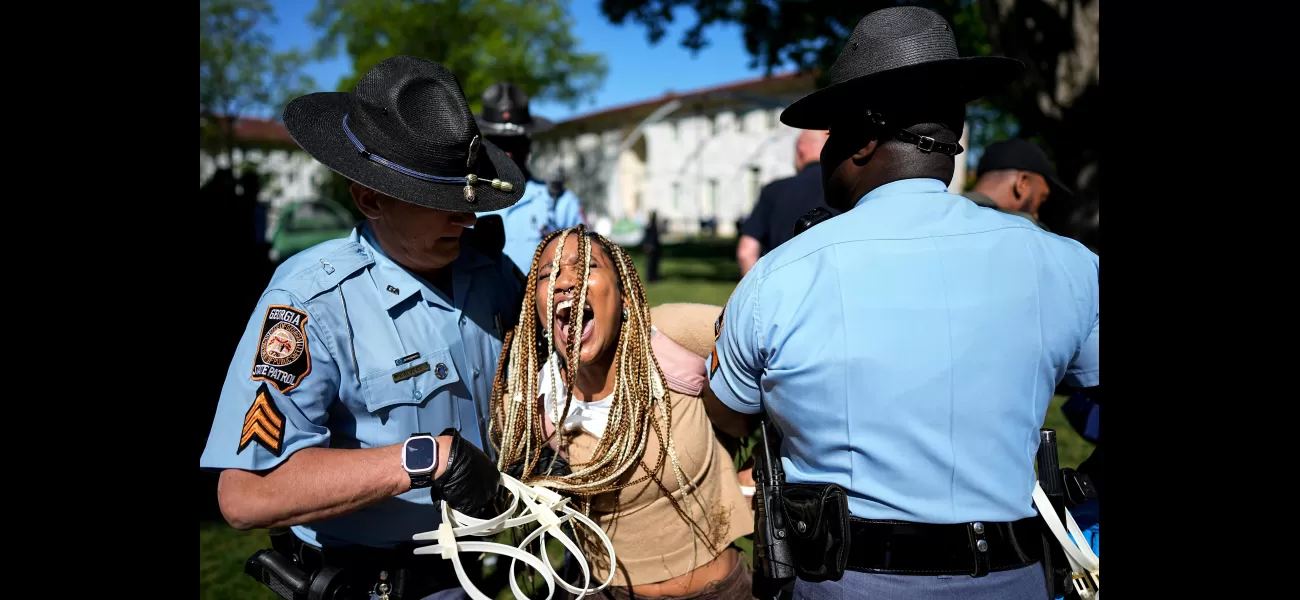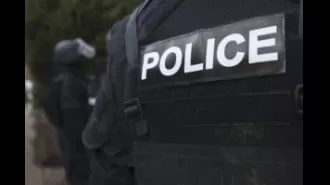College demonstrators are demanding forgiveness for tuition, legal consequences, academic standing, and graduation.
College students face consequences for pro-Palestinian protests, raising questions about amnesty and the lasting impact of suspensions and legal records.
April 28th 2024.

Maryam Alwan thought the worst was over when she was arrested by New York City police in riot gear along with other protesters on the Columbia University campus. After being loaded onto buses and held in custody for hours, she assumed she would face no further consequences. However, the following evening, she received an email from the university informing her that she and the other students were being suspended for their participation in the "Gaza Solidarity Encampment." This tactic has been adopted by colleges across the country in an attempt to quell the growing protests against the Israel-Hamas war.
The plight of these students has become a central part of the protests, with both students and faculty demanding amnesty for them. The main issue at hand is whether universities and law enforcement will dismiss the charges and refrain from imposing any further consequences, or if the suspensions and legal records will have a lasting impact on the students' futures. The terms of the suspensions vary from campus to campus; at Columbia and its affiliated Barnard College, Alwan and dozens of other students were not only barred from campus and classes, but also banned from dining halls and unable to attend in-person or virtual classes.
The fate of their academic careers remains uncertain. Will they be allowed to take final exams? What about their financial aid and graduation? While Columbia claims that the outcomes will be decided at disciplinary hearings, Alwan has yet to be given a date for hers. As a comparative literature and society major, she finds the entire situation to be "very dystopian."
What started at Columbia has now turned into a nationwide showdown between students and administrators over anti-war protests and the boundaries of free speech. In the past 10 days, hundreds of students have faced consequences such as arrests, suspensions, probation, and even expulsion from prestigious universities like Yale, the University of Southern California, and Vanderbilt. Barnard, a women's liberal arts college at Columbia, suspended over 50 students who were arrested on April 18 and evicted them from campus housing, according to reports from the Columbia Spectator campus newspaper.
However, on Friday, Barnard announced that they had reached agreements with "nearly all" of the students and restored their campus access. It is unclear how many students were affected, but the college stated that all students who had their suspensions lifted had agreed to follow college rules and were put on probation in some cases. On the night of the arrests, however, one Barnard student, Maryam Iqbal, received an email from a dean informing her that she could briefly return to her room with campus security before being kicked out. The email stated that she would have 15 minutes to gather her belongings.
Over 100 faculty members from Barnard and Columbia staged a "Rally to Support Our Students" last week, condemning the student arrests and demanding that the suspensions be lifted. Meanwhile, Columbia is still pushing to remove the tent encampment on the campus main lawn, where the graduation ceremony is set to take place on May 15. The students have demanded that the school cut ties with Israel-linked companies and guarantee amnesty for all students and faculty arrested or disciplined in connection with the protests. Negotiations with the student protesters are ongoing, according to Ben Chang, a spokesperson for Columbia. "We have our demands, they have theirs," he said.
For international students facing suspension, there is the added fear of losing their visas, according to Radhika Sainath, an attorney with Palestine Legal. She helped a group of Columbia students file a federal civil rights complaint against the school on Thursday, accusing them of not doing enough to address discrimination against Palestinian students. Sainath describes the punishment faced by these students as "draconian" and "over-the-top callousness."
At Yale, over 40 students were arrested during a demonstration last week, including senior Craig Birckhead-Morton. He is set to graduate on May 20, but the university has not informed him if his case will be brought before a disciplinary panel. He is concerned about receiving his diploma and fears that his acceptance to Columbia graduate school may be in jeopardy. "The school has done its best to ignore us and not tell us what happens next," said Birckhead-Morton, who is majoring in history.
Across the country, college administrators are struggling to find a balance between free speech and inclusivity. Some demonstrations have included hate speech, anti-Semitic threats, or support for Hamas, the group responsible for attacking Israel on October 7 and sparking the war in Gaza that has claimed more than 34,000 lives. The pressure to clear protests is heightened due to upcoming commencement ceremonies. University officials claim that arrests and suspensions are a last resort, and they give ample warnings beforehand for protesters to clear the area.
Vanderbilt University in Tennessee has issued what is believed to be the only student expulsions related to protesting the Israel-Hamas conflict, according to the Institute for Middle Eastern Understanding. After more than two dozen students occupied the university chancellor's office for several hours on March 26, the university summoned police and arrested several protesters. Vanderbilt then proceeded to issue three expulsions, one suspension, and placed 22 protesters on probation. In an open letter to Chancellor Daniel Diermeier, over 150 Vanderbilt professors criticized the university's actions as "excessive and punitive."
Freshman Jack Petocz, 19, who was expelled from Vanderbilt, is currently allowed to attend classes while he appeals the decision. However, he has been evicted from his dorm and is now living off campus. Petocz believes that his activism and organizing in high school is what helped him get into Vanderbilt and secure a merit scholarship for activists and organizers. His college essay was about organizing walkouts in rural Florida to protest against Governor Ron DeSantis' anti-LGBTQ policies. "Vanderbilt seemed to love that," said Petocz. "Unfortunately, the buck stops when you start advocating for Palestinian liberation."
The Associated Press' education coverage has received financial support from multiple private foundations. AP is solely responsible for all content. You can find AP's standards for working with philanthropies, a list of supporters, and funded coverage areas on AP.org.
The plight of these students has become a central part of the protests, with both students and faculty demanding amnesty for them. The main issue at hand is whether universities and law enforcement will dismiss the charges and refrain from imposing any further consequences, or if the suspensions and legal records will have a lasting impact on the students' futures. The terms of the suspensions vary from campus to campus; at Columbia and its affiliated Barnard College, Alwan and dozens of other students were not only barred from campus and classes, but also banned from dining halls and unable to attend in-person or virtual classes.
The fate of their academic careers remains uncertain. Will they be allowed to take final exams? What about their financial aid and graduation? While Columbia claims that the outcomes will be decided at disciplinary hearings, Alwan has yet to be given a date for hers. As a comparative literature and society major, she finds the entire situation to be "very dystopian."
What started at Columbia has now turned into a nationwide showdown between students and administrators over anti-war protests and the boundaries of free speech. In the past 10 days, hundreds of students have faced consequences such as arrests, suspensions, probation, and even expulsion from prestigious universities like Yale, the University of Southern California, and Vanderbilt. Barnard, a women's liberal arts college at Columbia, suspended over 50 students who were arrested on April 18 and evicted them from campus housing, according to reports from the Columbia Spectator campus newspaper.
However, on Friday, Barnard announced that they had reached agreements with "nearly all" of the students and restored their campus access. It is unclear how many students were affected, but the college stated that all students who had their suspensions lifted had agreed to follow college rules and were put on probation in some cases. On the night of the arrests, however, one Barnard student, Maryam Iqbal, received an email from a dean informing her that she could briefly return to her room with campus security before being kicked out. The email stated that she would have 15 minutes to gather her belongings.
Over 100 faculty members from Barnard and Columbia staged a "Rally to Support Our Students" last week, condemning the student arrests and demanding that the suspensions be lifted. Meanwhile, Columbia is still pushing to remove the tent encampment on the campus main lawn, where the graduation ceremony is set to take place on May 15. The students have demanded that the school cut ties with Israel-linked companies and guarantee amnesty for all students and faculty arrested or disciplined in connection with the protests. Negotiations with the student protesters are ongoing, according to Ben Chang, a spokesperson for Columbia. "We have our demands, they have theirs," he said.
For international students facing suspension, there is the added fear of losing their visas, according to Radhika Sainath, an attorney with Palestine Legal. She helped a group of Columbia students file a federal civil rights complaint against the school on Thursday, accusing them of not doing enough to address discrimination against Palestinian students. Sainath describes the punishment faced by these students as "draconian" and "over-the-top callousness."
At Yale, over 40 students were arrested during a demonstration last week, including senior Craig Birckhead-Morton. He is set to graduate on May 20, but the university has not informed him if his case will be brought before a disciplinary panel. He is concerned about receiving his diploma and fears that his acceptance to Columbia graduate school may be in jeopardy. "The school has done its best to ignore us and not tell us what happens next," said Birckhead-Morton, who is majoring in history.
Across the country, college administrators are struggling to find a balance between free speech and inclusivity. Some demonstrations have included hate speech, anti-Semitic threats, or support for Hamas, the group responsible for attacking Israel on October 7 and sparking the war in Gaza that has claimed more than 34,000 lives. The pressure to clear protests is heightened due to upcoming commencement ceremonies. University officials claim that arrests and suspensions are a last resort, and they give ample warnings beforehand for protesters to clear the area.
Vanderbilt University in Tennessee has issued what is believed to be the only student expulsions related to protesting the Israel-Hamas conflict, according to the Institute for Middle Eastern Understanding. After more than two dozen students occupied the university chancellor's office for several hours on March 26, the university summoned police and arrested several protesters. Vanderbilt then proceeded to issue three expulsions, one suspension, and placed 22 protesters on probation. In an open letter to Chancellor Daniel Diermeier, over 150 Vanderbilt professors criticized the university's actions as "excessive and punitive."
Freshman Jack Petocz, 19, who was expelled from Vanderbilt, is currently allowed to attend classes while he appeals the decision. However, he has been evicted from his dorm and is now living off campus. Petocz believes that his activism and organizing in high school is what helped him get into Vanderbilt and secure a merit scholarship for activists and organizers. His college essay was about organizing walkouts in rural Florida to protest against Governor Ron DeSantis' anti-LGBTQ policies. "Vanderbilt seemed to love that," said Petocz. "Unfortunately, the buck stops when you start advocating for Palestinian liberation."
The Associated Press' education coverage has received financial support from multiple private foundations. AP is solely responsible for all content. You can find AP's standards for working with philanthropies, a list of supporters, and funded coverage areas on AP.org.
[This article has been trending online recently and has been generated with AI. Your feed is customized.]
[Generative AI is experimental.]
0
0
Submit Comment





